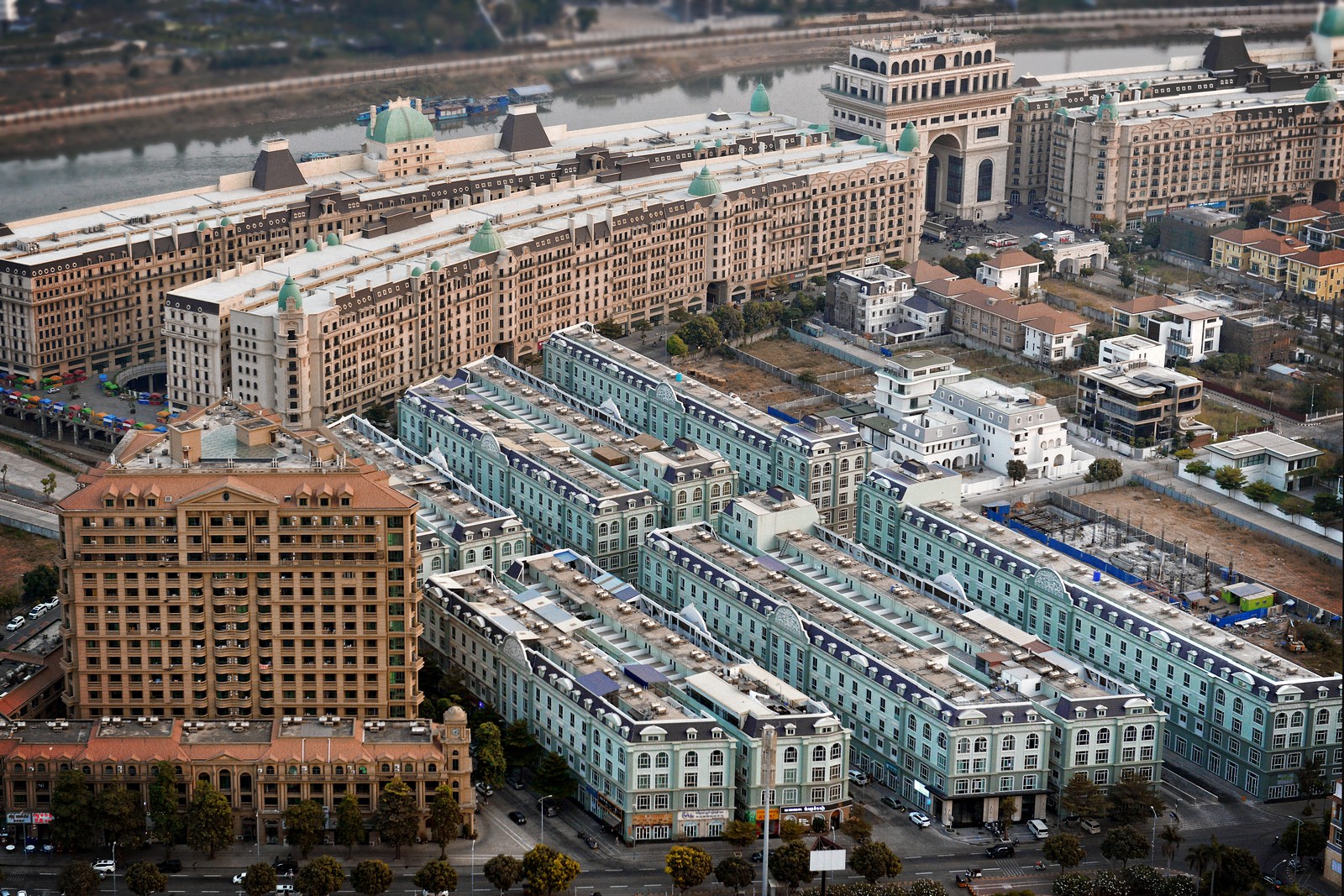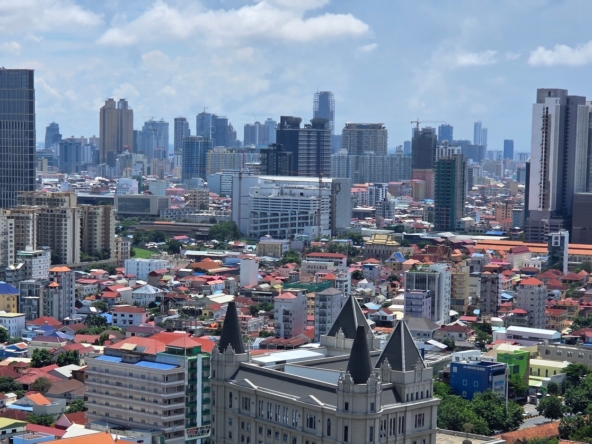Based on analysis, based on insights from CBRE Cambodia’s we developed a summary of current state of the Cambodian real estate market in Q1 2024. By understanding the trends, challenges, and positive developments across various sectors, investors, developers, and other stakeholders can make informed decisions and navigate the path towards success in this dynamic market.
Macroeconomic Environment
Cambodia’s economic growth is projected to reach 5% in 2024 according to the World Bank, lagging behind Vietnam’s projected growth of 6.5%. This signifies a moderate expansion, but concerns linger regarding the ongoing US-China trade war and the global economic slowdown. These factors could potentially dampen foreign investment and hinder export-oriented industries.
A silver lining emerges in the form of a 18% year-on-year increase in tourist arrivals in Q1 2024 compared to the same period in 2023. This positive trend bodes well for the hospitality sector, which heavily relies on tourism revenue to flourish.
Real Estate Market Trends: A Sector-by-Sector Breakdown
Office Market
The office segment in Cambodia is in its nascent stages, characterised by a gradual rise in demand. However, this growth is tempered by the limited presence of established companies, international brands, and retailers. This restricted pool of potential tenants translates to a slow absorption rate for available office space.
- Oversupply casts a long shadow over the office market, with vacancy rates in Phnom Penh’s prime office buildings reaching a concerning 15%. This has resulted in a decrease in average asking rents year-on-year, putting pressure on landlords.
- A significant discrepancy exists between asking rents and achieved rents, which are the rents that are finally agreed upon after negotiations between landlords and tenants. This gap highlights the current weakness in the market, with landlords willing to offer concessions to attract tenants.
- Potential office tenants are adopting a cautious wait-and-see approach due to economic uncertainty. This further intensifies the pressure on rental rates as landlords compete for a limited pool of tenants.
Retail Market
Similar to the office space segment, the retail sector in Cambodia faces challenges due to a limited pool of established players. This translates to a somewhat stagnant market, with prime shopping mall rental leases averaging $25.8 per sqm/month in Q3 2023, showcasing a slight dip compared to the previous year. This suggests potential oversupply within the premium mall space.
- Mirroring the office market, the retail sector is grappling with an oversupply issue. An additional 10% of retail space is anticipated to enter the market in 2024, potentially leading to a decline in occupancy rates.
- The landscape of weekend markets and pop-up markets is experiencing mixed results. While some attract enthusiastic crowds, others face dwindling foot traffic. This underscores the need for innovation and creating unique customer experiences to stand out in a competitive environment.
- The rise of e-commerce is disrupting traditional brick-and-mortar stores. Retailers need to adapt by embracing omnichannel strategies that seamlessly integrate online and offline shopping experiences to cater to evolving consumer preferences.
Hospitality Market
The hospitality sector in Cambodia, particularly in the coastal city of Sihanoukville, is undergoing a period of significant transformation. While the specifics of this transformation remain unclear, the overall focus appears to be on attracting further investments to bolster the tourism industry. Cambodia boasts a rich cultural heritage and stunning natural beauty, making it a prime destination for leisure travellers.
- Tourist arrivals are on an upward trajectory. However, a notable trend is the predominance of business travellers as compared to leisure tourists. This shift in guest profiles could influence hotel occupancy rates and room rates.
- Hotel occupancy rates are exhibiting signs of improvement, particularly for 3-star hotels, which are experiencing a 10% increase in occupancy compared to Q1 2023. This suggests a growing demand for budget-friendly accommodations.
- The global economic slowdown is expected to lead to a 20% decrease in new hotel construction projects initiated in 2024. This cautious approach from investors in the hospitality sector indicates a wait-and-see attitude regarding the pace of recovery.
Residential Market (Condominiums & Landed Property)
The condominium and landed property market in Cambodia presents a contrasting picture. On one hand, there’s a significant oversupply of condominium units, exceeding a staggering 53,000 in Phnom Penh alone by Q3 2023. This oversupply has led to a year-on-year decline in average condo sales prices. This price drop suggests a struggle to meet current demand levels.
- A significant surge in new supply is expected in both condominiums (estimated at 10,000-12,000 units) and landed properties (projected to exceed 20,000 units) in 2024. This influx will likely put downward pressure on sale prices and rental rates, creating a more competitive market for developers.
- To attract buyers and tenants in this buyer’s market, developers are resorting to various strategies. Discounts, flexible payment plans (e.g., extended down payment periods), and bundled packages with furniture or appliances are becoming increasingly common.
- A concerning aspect of the booming residential market is a rise in conflicts between developers and homebuyers. Issues such as construction delays and handover problems are leading to frustration and disputes. These issues could potentially tarnish the reputation of developers and dampen buyer confidence.
- Serviced apartments are offering guaranteed rental returns to attract tenants. While this strategy can be enticing for investors seeking a steady income stream, it also carries risk. If occupancy rates fall below expectations, investors may struggle to meet the guaranteed returns, leading to financial strain.
Positive Outlooks, Challenges and Considerations
- The Cambodian government is actively engaged in promoting foreign direct investment (FDI) through initiatives such as tax breaks and streamlined business registration processes. This proactive approach aims to attract more capital inflow, stimulate economic growth, and create a more business-friendly environment.
- Infrastructure development is another positive indicator. The construction of expressways and bridges is enhancing connectivity throughout Cambodia. This improved infrastructure can benefit various sectors like tourism, manufacturing, and logistics by facilitating the movement of goods and people more efficiently.
- While the Cambodian real estate market presents opportunities, there are challenges to consider. Overcoming oversupply in several sectors will be crucial for sustained growth.
- The global economic climate remains uncertain, and potential slowdowns could impact foreign investment and tourist arrivals.
- Addressing the conflicts between developers and homebuyers is necessary to maintain buyer trust and ensure the smooth functioning of the residential market.
Ta strona jest także dostępna w językach:
![]() Polski (Polish)
Polski (Polish)




